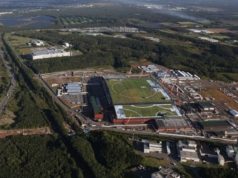Mustafa Suleyman, the CEO of the well-known AI company DeepMind, which Google acquired in 2014, took the stage at our Disrupt London event today to talk to our Special Projects Editor Jordan Crook about his company, its relationship with Google, and the future of AI.
The goal of DeepMind, Suleyman said, is to “solve intelligence and make the world a better place.” The company, he said, wants to build systems that can do exactly the same things that make us, as humans, smart. “We founded the company on the premise that many of our complex social problems are becoming increasingly stuck,” he said, referring to issues like climate change and access to food.
Suleyman believes that general learning systems are still decades away, though. Indeed, he argued that “when we say it’s 20 years out or decades way, we say that it so far out, we can’t really measure it.” Until then, though, the company remains focused on solving specific issues.
Related to this, Suleyman also argued that the kind of General AI we see in movies today probably won’t look anything like the general AI systems we will get decades from now. “When it comes to imagining what the future will be like, a lot of that is fun and entertaining, but it doesn’t bear a great deal of resemblance to the systems that we are building,” he said. “I can’t really think of a film that makes me think: yeah – AI looks like that.”
Crook and Suleyman also discussed a deeper issue with machine learning. “Are we going to pass on our own flaws to our machine learning algorithms?” Crook asked. “The way I think about these things is that we are destined to project our biases and judgments into our technical systems,” Suleyman answered. “And if we don’t think consciously as designers and technologists about how we are building those systems, then we will — without realizing it — unwillingly introduce all of those same biases into these systems.”
As for the relationship between DeepMind and Google, Suleyman clearly didn’t want to go into too much depth. “I think one of the things that made us successful as a startup was being in London and somewhat removed from the Valley way of doing things,” he said, which really doesn’t say much about his relationship with his corporate overlord. He did, however, note that Google gives the company access to lots of computational resources and that when the founders sold the company to Google, “it was very important to us that we would continue to run independently and control the kind of research we do independently.”
Another topic of the discussion was DeepMind’s work around health. The company is working with the National Health Service (NHS) in the UK on a project around the early detection of acute kidney injuries. Critics, however, argue that the collaboration with DeepMind is wider than the company and the NHS previously disclosed. In addition, it’s also working with the Moorfields Eye Hospital on looking at how it can use the hospital’s eye scans to diagnose eye conditions better and faster. The NHS, however, mostly used its own algorithm in its project, with DeepMind focussing on the front-facing app. Suleyman argued that this is due to the fact that it’s still early days for this collaboration, which only started 12 months ago.
DeepMind’s relationship with Google, though, may create some trust issues for patients, Crook argued. Suleyman, however, argued that the company has protocols in place to ensure who is in control of the data (in this case, that’s the hospital). In addition, he also argued that the company aims to be as transparent as possible and working with third-party auditors. DeepMind is also working on a “general transparency architecture” that will log when data is accessed, who is accessing it, and more.
In addition to discussing DeepMind on our stage today, the company also today announced the launch of the DeepMind Lab, a 3D game-like platform that’s tailored for agent-based AI research. This is a project DeepMind has already used internally and now it is open sourcing the project and making it available to all AI researchers. The code, as well as a number of maps for the game environment, will be up on GitHub in the next few days.






